- Quick Read
- Deep Read ( 7 Min. )

Why is Christian Science in our name?
Our name is about honesty. The Monitor is owned by The Christian Science Church, and we’ve always been transparent about that.
The Church publishes the Monitor because it sees good journalism as vital to progress in the world. Since 1908, we’ve aimed “to injure no man, but to bless all mankind,” as our founder, Mary Baker Eddy, put it.
Here, you’ll find award-winning journalism not driven by commercial influences – a news organization that takes seriously its mission to uplift the world by seeking solutions and finding reasons for credible hope.
Explore values journalism About usIn Today’s Issue
Monitor Daily Podcast
- Follow us:
- Apple Podcasts
- Spotify
- RSS Feed
- Download
TODAY’S INTRO
Monitor Daily Intro for September 8, 2017
A chain of powerful hurricanes in the southeastern US has triggered a harried cycle of brace-and-recover.
The stories of collective spirit there are too important to miss.
But some readers have expressed frustration that South Asia’s epic flooding – renewed in August and affecting some 40 million people – has not been adequately covered. We’re working on getting a reporter to the region. Stories from there will surely show some parallels and may offer new lessons.
Vaishnavi Chandrashekhar, a former Boston-based Monitor staffer now in Mumbai, writes in an email that residents of her city, too, are well known for helping each other. She saw that spirit last Tuesday, when a monsoon rain that coincided with a high tide left many stranded.
“Within hours, a shared Google spreadsheet of ‘rain hosts’ had been created,” she writes, “and social media hashtags spread to guide the stranded to strangers’ homes.”
(One complicating charge: The reliability of citizen actions allows authorities to skimp on measures to mitigate disaster.)
From rural India come studies in adaptation. Vaishnavi says that she spoke to a professor who has studied the way Hindu pilgrims use the Ganges riverbank near Allahabad each year. A tent city rises there and caters to millions, then comes down. Just as reliably, in flood or in drought, farmers move in to plant and harvest.
“Studying how people adapt in this area is not only useful for other parts of India but the world,” the professor told Vaishnavi. “Because more of the world is going to look like India than India is going to look like the world.”
Now to our five Friday stories.

Help fund Monitor journalism for $11/ month
Already a subscriber? Login

Monitor journalism changes lives because we open that too-small box that most people think they live in. We believe news can and should expand a sense of identity and possibility beyond narrow conventional expectations.
Our work isn't possible without your support.
Drivers of recovery, small businesses stir in Harvey's wake
Local firms need their communities to help them thrive. In return, they can help anchor their communities when major setbacks come.

-
Carmen K. Sisson Correspondent
Days after the floods receded, anecdotes of the grit and generosity of Houston’s small-business owners and their employees abound. The head chefs for Paper Co., a cafe, have spent the past week in a church parking lot, cooking breakfast and dinner for the streams of volunteers who gather there before and after helping gut flooded-out homes. “People are just doing what they know how to do,” says Trevor Little, a sous-chef. “We’re cooks, so we’re cooking.” While many small businesses likely will reopen soon, the coming months may test their nerves – and purse strings. Even as they deal with their own losses, businesses are providing not only helping hands in the rebuilding effort, but a precious sense of normality to communities still reeling from the 25 trillion gallons of water poured on their heads. One neighborhood plans to host its weekend farmers market, just like normal, says Plant-it-Forward president Liz Valette, and they want to see farmers there “as a sign of resiliency.” Ms. Valette is hopeful there may be some produce available to sell. “I got so excited when I saw things sprouting after a couple days,” she says. “Just being able to see things grow, I think it helps with the healing process after a loss.”
Drivers of recovery, small businesses stir in Harvey's wake
Even for a farmer, there is such a thing as too much water.
Sweat dripping from under his red, white, and blue cowboy hat, Guy Mouelet is standing in his farm at the corner of Fondren Road and Willowbend Boulevard here, taking a break between giant hacks with his shovel at the tangled green weeds that have overrun his eggplant bed. He recalls not thinking too much of hurricane Harvey before it broadsided Houston with days of torrential rain.
“I thought maybe it will be a little rain and it will pass, but after four days, when I came back and saw the water, water everywhere,” says Mr. Mouelet, his voice trailing off.
It will take “a couple of months” to get his farm back to pre-Harvey crop volumes, but now is the time to work, he says, not make excuses.
“We need to work, because people need it,” he adds. “People lost everything, and they need to eat to grow strong.”
The metaphor is apt. As the nation gears up for another major storm bearing down on Florida – and continues to assess the damage from Harvey, which Texas Gov. Greg Abbott (R) estimated at $150 billion to $180 billion – small businesses are helping lead the city’s recovery. Even as they deal with their own losses, they are providing not only helping hands in the rebuilding effort, but a precious sense of normality to communities still reeling from the 25 trillion gallons of water just poured on their heads.
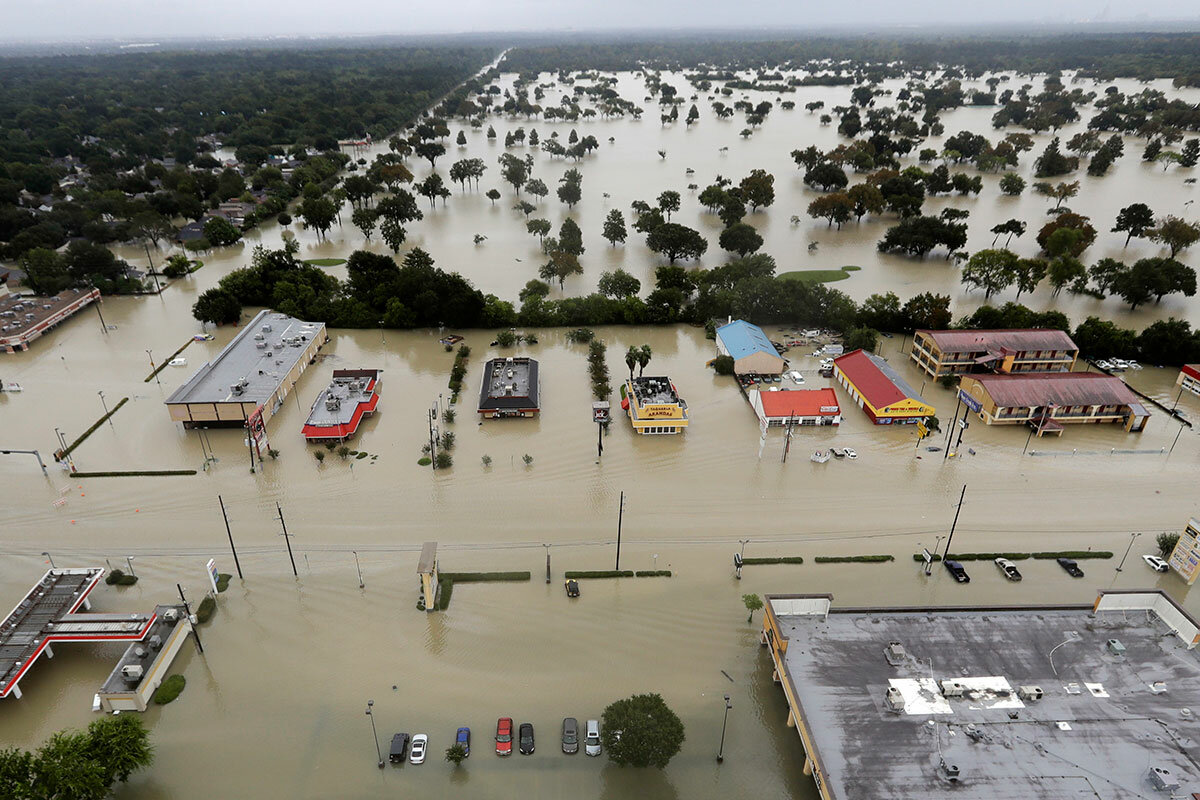
“There are going to be a number of challenges, but I think people are very resourceful, people are working very hard to be supportive of one another,” says Laura Murillo, president and chief executive officer of the Houston Hispanic Chamber of Commerce.
A week after the rain stopped, anecdotes of the grit and generosity of Houston’s small business owners and their employees abound.
There are the three Mexican bakers who, trapped by floodwaters in their store, baked nonstop for two straight days before handing out the fresh loaves of bread and pan dulce to fellow Houstonians and first responders. There’s Jim “Mattress Mack” McIngvale, who converted his two furniture stores into temporary shelters for more than 400 people. And there’s Cafeza, a small coffee shop that turned itself into an impromptu shelter and, later, free coffee dispensary for first responders.
'We're cooks, so we're cooking'
A few minutes from Cafeza, in the shadow of a tangle of elevated highways, sits Paper Co., another cafe where ’90s hits are played over the speakers and sales go toward feeding the local homeless population.
This week, however, Paper Co.’s two top chefs haven’t been there. They’ve been in a church parking lot 12 miles away, cooking breakfast and dinner for the streams of volunteers who gather there before and after dispersing throughout the city to help gut flooded-out homes.
“People are just doing what they know how to do,” says Trevor Little, Paper Co.’s sous chef. “We’re cooks, so we’re cooking.”
Simply being open can be an invaluable benefit for shaken Houstonians these days. Small businesses re-opening is “good for the psyche,” says David Ramos, the head chef at Paper Co.
“It’s scary when you go to the grocery store and you have to get in line just to get into the grocery store,” he says. “Putting things back to normal helps your mental psyche get back to normal.”
While many Harvey-impacted small businesses in Houston likely will re-open soon, the coming months are likely to test their nerves – and purse strings.
Small businesses are generally considered more vulnerable to natural disasters, especially in the short-term – with fewer resources to rebuild and absorb losses. Recovery will be a long process for business owners throughout southeast Texas. They spend their days pulling drenched carpet and soggy sheetrock from their workplaces, only to go home and do the same thing. At least 70 people were killed – a low death toll experts have called a testament to both people heeding advance warnings and southeast Texas’s all-hands-on-deck rescue effort – but 1 million people were displaced by the storm.
Plant-It-Forward, the small business that supports Mouelet and eight other farmers and connects them with customers for their produce, says its clients lost about 60 percent of their crop due to Harvey.
“The next few weeks will be a little tough,” says Liz Valette, the company’s president. “All the revenue streams we connect the farmers too, there are questions marks over them.”
'I do not feel like a victim'
Keith Kresta, a Crescent cotton farmer, grew up on a farm and is accustomed to the capriciousness of weather. Already mid-harvest, when he saw the Colorado River rising, he hastened to prepare his crops, move his cattle to higher ground, load his furniture into trailers, and install a pipe ring and pump around his farmhouse. As darkness fell on Texas, there was nothing more Mr. Kresta could do. He had managed to harvest 60 percent of his 800 acres.
Around 1 a.m., he and his wife, Sara, stood inside their house and watched the floodwaters creep up the walls. When the water reached their knees, they hugged one another and tried to smile.
“The last thing we said was, ‘We’ll make it,’ and we walked out of the house,” Kresta says.

The crop didn’t fare well. Cotton seed is sprouting inside the bolls, and any salvageable lint is stained and of poor quality. Most of the cotton modules in his field were blown apart by the wind or swept away by the river. Mud coats the remainder.
It’s a stark contrast from the Sunday before, when cars were stopping alongside his farm to take pictures of the rare “August snow.”
Texas is the No. 1 producer of cotton in the United States, and before Harvey, farmers in Wharton County were anticipating their best harvest in more than 10 years. Despite farmers working feverishly in advance of the storm, without enough trucks to haul the cotton away or gins to process the crop less than an estimated 14 percent of the state’s fields were harvested before Harvey made landfall Aug. 25.
“A guy told me he had 36 round modules,” says Jimmy Roppolo, general manager of the United Agricultural Cooperative gin in Danevang, Texas. “After Harvey, he could only find eight, and they were under water. This year looked like the promising year that would prop them up, but with this, it’s going to be tough.”
Kresta estimates a loss of more than $140,000 for his farm. Insurance will pay for some of it, but it will only cover 70 percent of his 10-year average yield. The past decade has not been good.
“You work 12 months out of the year in a noble profession because you want to contribute – you want to feed and clothe the world,” Kresta says, his voice breaking. “To see it all wiped away just a few days before harvest is impossible to put into words.”
He’s not sure what the future holds for his family or his farm, but he is quick to point out those who lost so much more, from crops and homes to loved ones. He clings to his faith and believes God will not challenge him with more than he can handle. Material things are replaceable, he says. And he believes that he and the other farmers in his community will survive.
“I sat in church this morning, and I felt at peace,” Kresta says. “I do not feel like a victim – my story is just one of thousands. You learn what people value in a time of crisis, and I value my family and my faith.”
Signs of resiliency
Across Houston, small businesses have continued to open back up and pitch in. One neighborhood emailed Ms. Valette to tell her they’ll be hosting their weekly farmers market this weekend, just like normal, and that they want to see farmers like Mouelet there “as a sign of resiliency.”
Valette is hopeful there may be some produce available to sell by then.
“I got so excited when I saw things sprouting after a couple days,” she says. “Just being able to see things grow, I think it helps with the healing process after a loss.”
Share this article
Link copied.

A new era of bipartisanship? Sizing up the prospects.
A new strain of cross-aisle dealmaking shows signs of taking hold in Washington. Does it represent a lasting shift in approach?

- Quick Read
- Deep Read ( 5 Min. )
This week, President Trump abruptly decided to give bipartisanship a try. Ignoring the wishes of Republican congressional leaders and his own cabinet, he brokered a deal with Democratic leaders Nancy Pelosi and Charles Schumer to advance hurricane aid, along with a three-month extension of the US's borrowing ability and spending, plus a temporary extension of federal flood insurance. The $15 billion deal passed the Senate Thursday and the House on Friday – albeit without the votes of many conservatives in both chambers, who objected to bundling hurricane aid with a vote on the debt ceiling, and the lack of spending controls. This is not the kind of bipartisanship Washington is used to. Instead of working behind the scenes to bring key players on both sides of an issue together, Mr. Trump publicly sided with Democrats in a way that clearly caught members of his own team off guard. And no one on either side of the aisle is necessarily counting on this trend to last. Still, it gave Trump one road map for how to bypass congressional gridlock and move forward on an important matter.
A new era of bipartisanship? Sizing up the prospects.
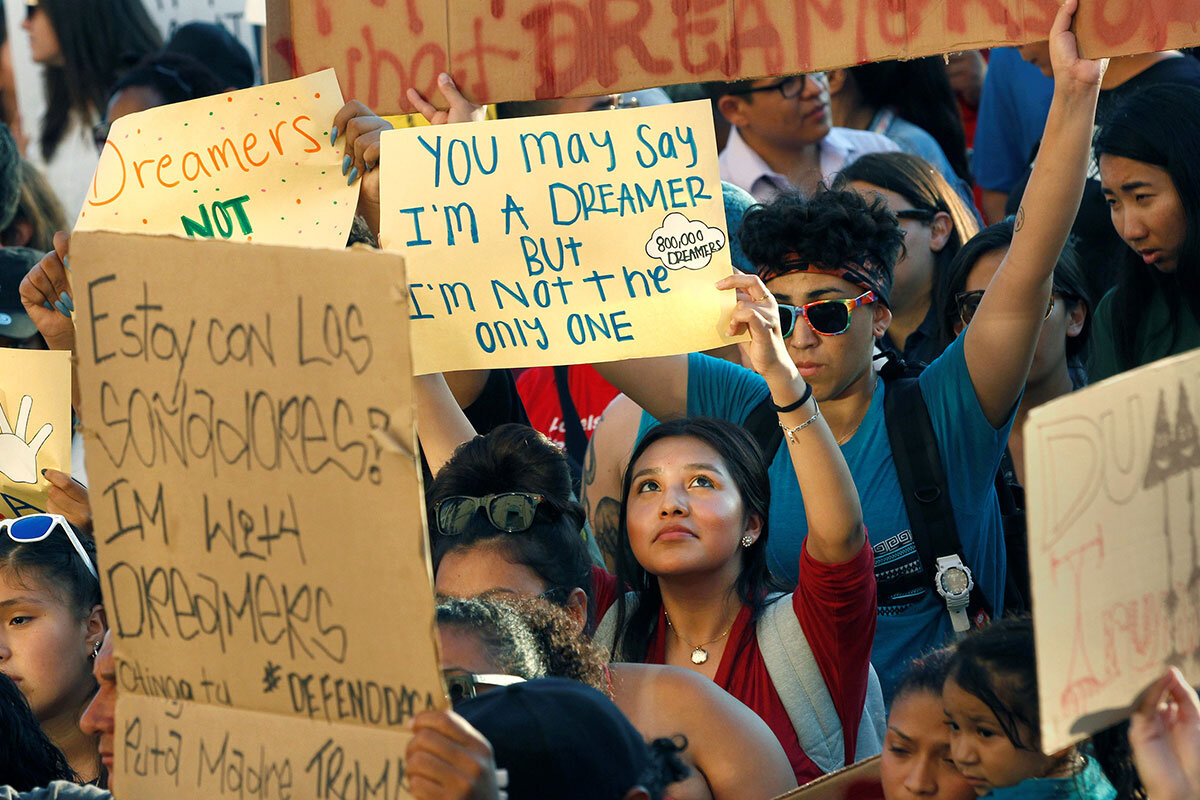
Returning to Washington after the August recess, Sen. Tim Kaine sensed that change was in the air.
The embarrassing failure of Republican lawmakers to repeal and replace Obamacare – one of the GOP’s top priorities – along with the sharp criticism many members had aimed at President Trump after the violence in Charlottesville, Va., would make for a “dramatically different” dynamic in the nation’s capital, the Virginia Democrat told reporters.
But even he had no idea how dramatic a political shift was in store.
This week, Mr. Trump abruptly decided to give bipartisanship a try. Ignoring the wishes of Republican congressional leaders and his own cabinet, he brokered a deal with Democratic leaders Nancy Pelosi and Charles Schumer to advance hurricane aid, along with a three-month extension of the nation’s borrowing ability and spending, plus a temporary extension of federal flood insurance.
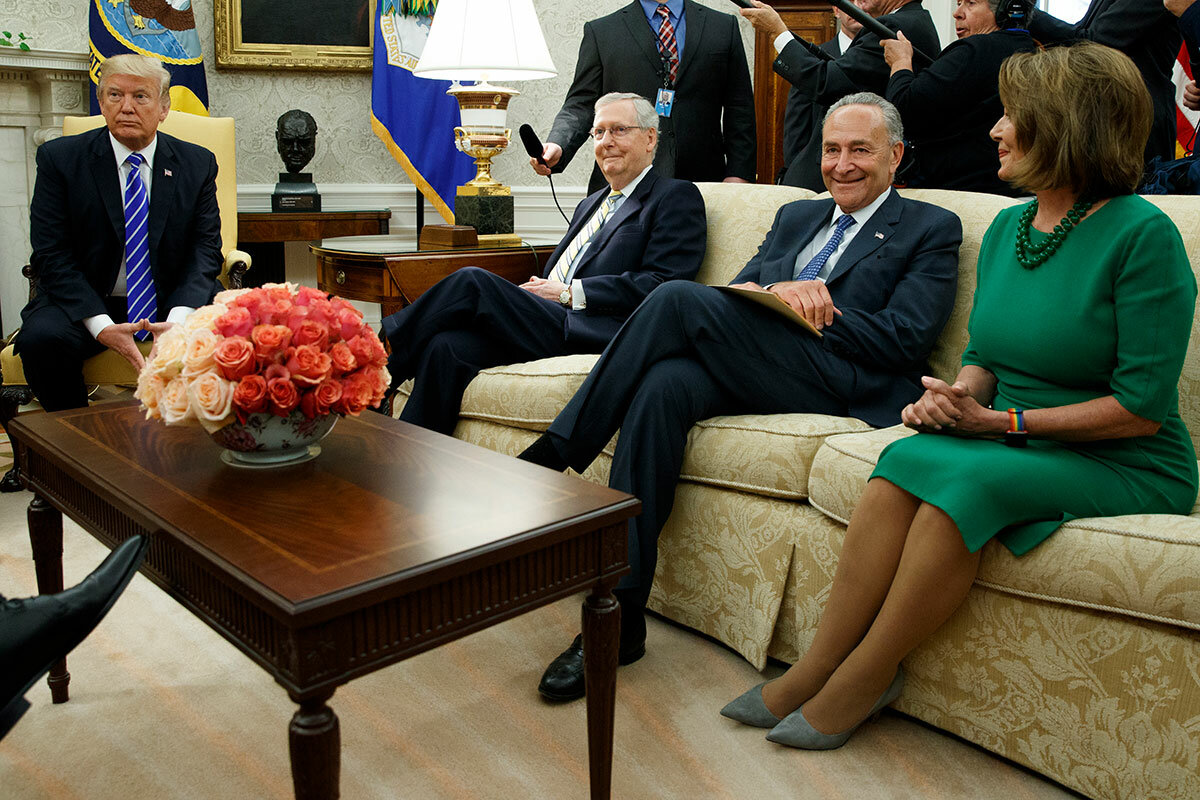
The $15.3 billion deal passed the Senate Thursday and the House on Friday – albeit without the votes of many conservatives in both chambers, who objected to bundling hurricane aid with a vote on the debt ceiling and to the lack of spending controls.
This is not the kind of bipartisanship Washington is used to. Instead of working behind the scenes to bring key players on both sides of an issue together, Trump publicly sided with Democrats in a way that clearly caught members of his own team off guard. And no one on either side of the aisle is necessarily counting on this trend to last. Still, it gave Trump one roadmap for how to bypass congressional gridlock and move forward on an important matter. And that, in turn, may help ease the way forward on some other top legislative priorities.
“We can all criticize the deal, but the one thing that happened is, we got a deal,” says Sen. David Perdue (R) of Georgia, one of the president’s allies on the Hill. “I look at that as progress in a place that’s this dysfunctional.”
That's not to say many Republicans didn't take the move as a slap in the face.
“My problem with what happened Tuesday was the way it was done,” says former Senate majority leader Trent Lott (R) of Mississippi in an interview. The president’s treatment of GOP leaders “was embarrassing.” Still, Mr. Lott concedes, “there’s some positive aspects to it. Maybe it’s cleared the deck enough … to get to tax reform, which they must do.”
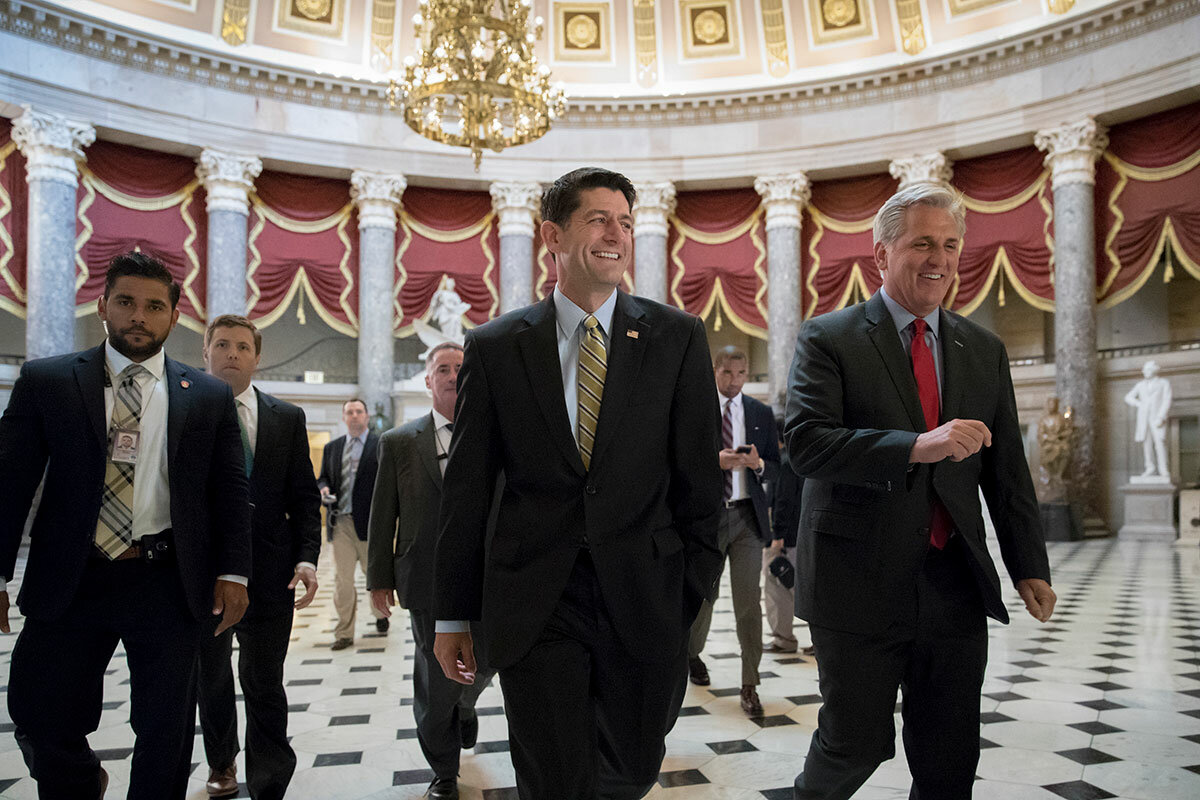
Democrats are hoping their new working relationship with the president will improve the prospects for codifying President Obama’s protections for "Dreamers," the young undocumented adults brought into the country as children under his “Deferred Action for Childhood Arrivals” program, known as DACA.
Trump announced this week that he is winding down that program, giving Congress six months to come up with a law that allows these “Dreamers” to live and work in the United States without fear of deportation. The bipartisan DREAM Act – which includes a path to legal status for these young people – has never made it all the way through both houses.
House minority leader Pelosi of California told reporters Thursday that the president has assured her he wants Congress “to get this done,” though she clarified that the legislation will “probably” have to include some border enforcement.
Republicans say no deal will be possible without beefing up the border, and Democratic leaders appear to be open to this, as long as it doesn’t include funding for the president’s “wall” – a difference that might be papered over with semantics.
Another hot-button issue – health care – may also be moving toward a bipartisan solution.
With 2018 enrollment in Obamacare just weeks away and the private exchange markets under great strain, the Senate Committee on Health, Education, Labor and Pensions this week held two hearings on stabilizing the exchanges. The committee chairman, Lamar Alexander (R) of Tennessee, and ranking member Patty Murray (D) of Washington, are experienced hands in forging bipartisan legislation.
The fact that nearly a third of the Senate showed up for an early morning seminar with insurance commissioners shows a “seriousness of purpose” among senators and “a recognition on both sides of the aisle that we need to do something,” Sen. Susan Collins (R) of Maine told reporters.
Senator Collins was one of three Republicans to vote against a GOP plan to repeal and replace Obamacare in July, helping to kill one of the the party’s main legislative goals. Another such attempt is being made, but the narrower, bipartisan fix appears to have a greater chance of passage.
“We stand an excellent chance to see a short-term fix,” says Sen. Bernie Sanders (I) of Vermont, a member of the health committee, speaking to the Monitor.
As for the Republicans’ main goal this fall – overhauling the tax code – a big question mark hangs over that one. Republicans still disagree internally on the details, yet they appear to be looking to pass a tax package without Democratic votes. Will it meet the same fate as Obamacare repeal?
Democrats would like to take part in negotiations, but only under certain conditions. Will Trump invite them in – at the risk of further alienating his own party?
“If we get bipartisan work, people complain. If we don’t get bipartisan work, people complain,” says Senator Perdue, speaking with reporters about the president’s deal with Democrats this week. "The president's trying to lead toward solutions."

Europe begins to curb its migrant crisis – but at what cost?
When statistics show a crisis waning, it’s worth checking whether the measures being used to drive change are tempered by compassion.

- Quick Read
- Deep Read ( 9 Min. )
After five difficult years of human pain and political drama, Europe’s migrant crisis may be nearing a solution. But at what moral price? Under pressure from growing numbers of migrants and refugees, the Italian government has adopted a radical and controversial new policy to stem the flow: With backing from the European Union, Rome is helping the Libyan Coast Guard turn boats back and cracking down on search-and-rescue operations by international humanitarian groups. The policy appears to be working. The number of migrants arriving in Italy has plummeted in recent weeks: August arrivals fell more than 80 percent from the year before. But nongovernmental organizations warn that the refugees returned to Libya are being condemned to prisons where torture and rape are commonplace. Italy risks being complicit in the abuse in the prisons, the NGOs argue. Further, Libya’s nascent Coast Guard has issued threats of violence against – and fired upon – NGO rescue vessels operating in the area.
Europe begins to curb its migrant crisis – but at what cost?

Statistically, it seems clear: Italy has figured out how to allay Europe’s migrant crisis.
After five difficult years of human pain and political drama, the number of migrants arriving in the country has plummeted in recent weeks. Only 15,365 landed at Italian ports in July and August, a 65 percent drop from the same period last year. August arrivals fell more than 80 percent from the year before.
Driving the downturn is Rome’s effort, with European Union backing, to help the Libyan Coast Guard turn boats back and crack down on search-and-rescue operations by international humanitarian groups. In addition, Italy is trying to cooperate with such authorities as can be found in Libya’s chaotic political landscape to police Africa’s people-smuggling routes.
Under pressure from next year's elections, in which immigration is an increasingly polarizing issue, government officials are pleased. “Balance is being restored” in the Mediterranean, Foreign Minister Angelino Alfano said recently.
But at what moral price?
Though the flow of people to Europe is being throttled, alarmed nongovernmental organizations warn that the refugees returned to Libya are being condemned to prisons where torture and rape are commonplace. Italy risks being complicit in the abuse in the prisons, the NGOs argue, and is hampering their humanitarian operations by imposing a “code of conduct” on those rescuing migrants at sea. Further, Libya’s nascent Coast Guard has issued threats of violence against – and fired upon – NGO rescue vessels operating in the area, prompting several of the groups to suspend operations.
“We are seeing an erosion of recognized international principles to save lives at sea,” warns David Hammond, head of Human Rights at Sea.
Pressure is building
As in other European countries, the arrival of large numbers of migrants and refugees has become a sore political point in Italy, offering populist and extreme right-wing parties rich campaign pickings as next year’s parliamentary elections draw near.
And Italy’s ad hoc reception system for migrants, cobbled together in emergency fashion in recent years and bereft of any coherent body of law to guide it, can no longer cope, experts say.
Some half a million migrants have landed on Italy’s shores over the past three years. Almost all of them apply for political asylum because that is the only way they might be allowed to stay in Europe, and because the Italian asylum process, stretched out by appeals, can easily take more than three years.
But 51 percent of them are denied asylum, according to official figures, and so are ejected from the camps, disused hotels, or other facilities where they had been living. Legally they should be deported, “but we do not have an efficient system for this,” a senior official admits, so they almost all stay in Italy.
(Italy is not alone: A European Union report last March found that only 27 percent of the 1 million migrants ordered to leave EU territory in 2014-15 were actually sent home.)
For years Italy got by with its rickety reception system because most of the migrants and refugees did not want to stay, but made their way to wealthier countries further north. Now, however, Italy’s neighbors to the north have sealed their borders; the migrants are trapped, and pressure is building.
The only European program to relieve that pressure, catering mainly to Eritreans and Syrians who arrived since September 2015 – whose asylum requests are almost always granted – has relocated just 8,205 applicants from Italy to other EU countries. That is a drop in the ocean. Europe, Italian officials complain with some justification, has turned its back on the problem.
Even those who are granted political asylum and permission to work find that welcome is not worth much in Italy. “The government makes you legal but there is no integration,” complains Simon, an Eritrean refugee who preferred not to give his family name. “Hardly anyone gets Italian lessons, and if you don’t speak Italian how can you find a job?”
Nor can the refugees go anywhere else. Under EU rules set out in the Dublin Treaty, migrants and refugees are obliged to stay in the country where they are first registered – almost always Italy since Turkey closed the route to Greece. The EU is considering a reform of the Dublin rules, but no change is in sight soon enough for Rome.
Libya's new Coast Guard
But while Rome has been unable to address its domestic immigration issues, it has moved purposefully to stanch the flow of new migrants attempting to arrive. “I need to get control of the border in a short time,” says Italian Interior Minister Marco Minniti.
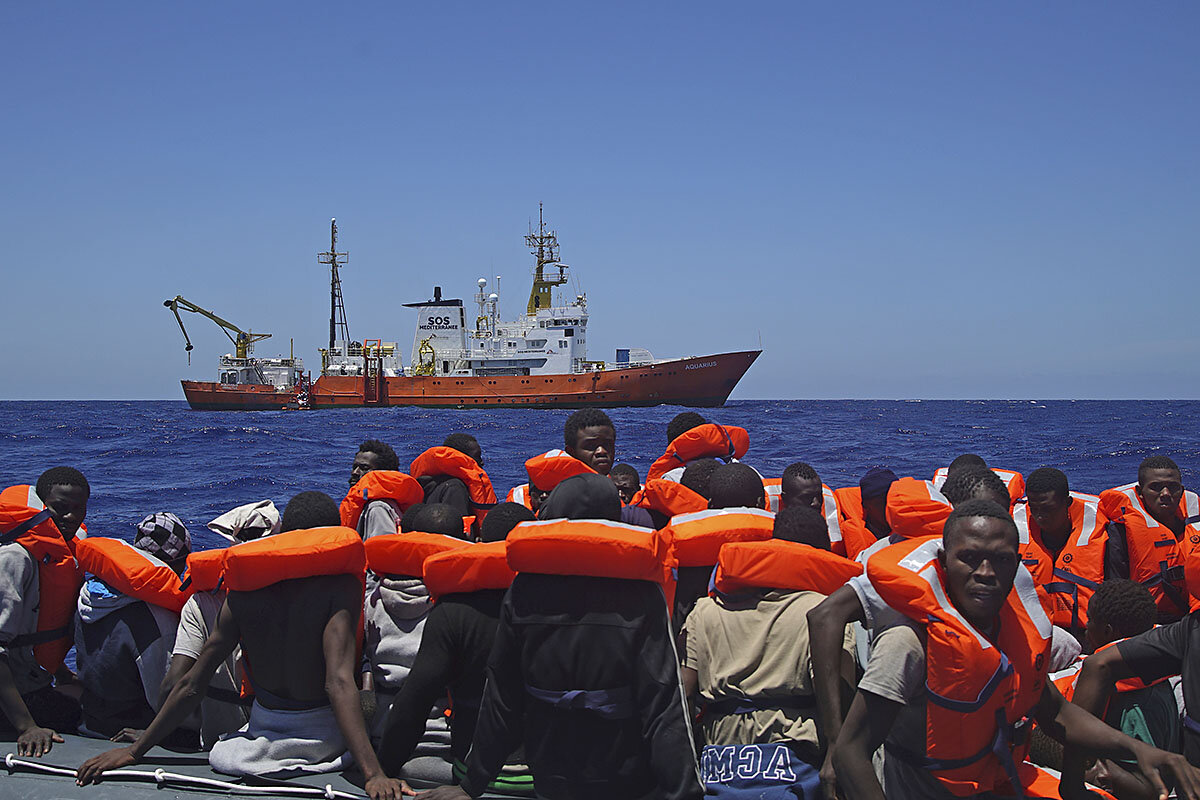
To that end, Italy recently dispatched the first of 10 new Coast Guard patrol boats to the internationally recognized Government of National Accord in Tripoli, along with Italian trainers, using 46 million euros ($55 million) of European Union funds.
“We have had good results from this strategy,” says the senior Italian official, pointing to the fall in migrant arrivals in recent months.
There has certainly been much less drama this year on the Central Mediterranean route from Libya to Italy than is normal for the summer months when the weather is good and people-smugglers are usually busy. Search and rescue vessels run by NGOs, patrolling outside Libya’s 12 mile stretch of territorial waters, report finding far fewer rubber dinghies in distress, overloaded with migrants.
Libyan Coast Guard officials say this is because they have been more active in their own territorial waters, intercepting the migrant boats and towing them back to the coast. There have also been unconfirmed reports that local militiamen in control of a major migrant embarkation beach are preventing boats from leaving, allegedly in the hope of being paid for this new work.
“Something is going on in Libya that we don’t know about,” says Gabriele Eminente, head of the Italian branch of Doctors Without Borders (MSF), which has been active in rescuing migrants in distress.
The Libyan Coast Guard recently announced that it was extending its search and rescue authority 80 miles from the coast, and warned NGO boats to stay out of that zone. Mr. Minniti says that Libya cannot make “unilateral” decisions without international consultation, but a Coast Guard boat shot across the bows of an NGO boat in August and the Italian authorities have warned that even international waters are not safe.
Three NGOs have suspended operations in the face of what one called “an explicit threat.” “There is serious uncertainty among a lot of search and rescue NGOs about the safety of their crews because of an emboldened Libyan Coast Guard,” says David Hammond. “They have arguably been emboldened by the actions of the Italian state.”
Hampering NGOs?
The action that has most concerned NGOs is the Italian government’s demand that they sign a code of conduct regulating and circumscribing their operations. That came in the wake of allegations by right-wing politicians that NGO rescue vessels were acting as a “marine taxi service” for migrants and refugees, encouraging them to head for Europe.
Similar charges led a public prosecutor in Sicily to confiscate the Iuventa, a vessel belonging to the German rescue group Jugend Rettet, as part of an investigation into human trafficking amid suspicions that the NGO had colluded with smugglers.
Five of the eight NGOs operating rescue services in the central Mediterranean have now signed the charter, which obliges them to welcome armed Italian police on board, provide the police with information, and to collect smugglers’ boats and outboard engines.
“We have maximum faith in the only country that is continuing to disembark people on its shores,” says Regina Catrambone, co-founder of the Migrant Offshore Aid Station, the first group to send a search and rescue boat to North African waters after the Italian navy discontinued its operations in 2014.
With NGO vessels rescuing around 40 percent of the migrants who end up in Italy, security concerns mean “it is very important for me as interior minister … to rely on full cooperation from NGOs … in counter-terrorist operations,” Minniti adds. “NGOs that sign are a full part of the Italian search and rescue system. Those that haven’t are not.”
That is exactly why MSF has refused to sign the code, explains Mr. Eminente. “By signing you agree to become part of a system that is more than search and rescue,” he worries. “You become part of an investigative system incorporating military forces that work with the Libyans. MSF is perceived as independent. That is the very basis of our existence.”
With three NGO boats suspended because of Libyan threats, one in judicial custody, and two being refitted, only three private vessels are currently operational off the Libyan coast. That means less international surveillance of Libyan Coast Guard activities.
Abuses in Libya
Clearly Libyan boats are carrying rescued migrants back to Libya, which is the last place they want to be. Migrants taken back to shore describe being beaten, robbed, and taken to detention centers.
Conditions in such centers, run by the government, militias, and smugglers, are appalling; rape and violent beatings are routine according to accounts by former inmates and United Nations reports. “The list of violations and abuses faced by migrants in Libya is as long as it is horrific,” the UN High Commissioner for Human Rights, Zeid Ra’ad Al Hussein said last December, issuing a human rights report.
Migrants in Libya “face torture, forced labor, and sexual exploitation,” added the UN Secretary General’s special representative in Libya, Martin Kobler.
Under international law, people rescued at sea must be taken to safe harbor where they can ask for protection without fear of abuse. “Libya is not that place,” says Annemarie Loof, MSF’s head of operations.
“The Italian navy and others who send [migrants] back are complicit in their treatment,” argues Hammond.
Minniti insists that Italy helps the Libyan Coast Guard to operate only in Libyan territorial waters, where arguably the migrants have not legally left Libya and international obligations do not hold. But he acknowledges that “there is a problem with human rights” in Libyan detention centers and suggests that “the international community must guarantee their human rights conditions” through UN agencies such as the International Office for Migration and the UN High Commission for Refugees.
'It’s an idea'
Reforms to Europe’s approach may be needed, but “a main part of the equation is playing out on the other side of the Mediterranean” in Libya and the countries further south from which most migrants set out, insists Minniti, the Italian interior minister.
To that end he says he is giving money not just to the Libyan Coast Guard, but to militiamen and tribal leaders in southern Libya who until now have run the criminal people-smuggling business in the Sahara desert. Now he is paying them to police the smuggling routes and to shut them down.
“Good money sweeps away bad money,” he argues, though he admits that “people thought I was crazy” when he first dived into the chaos of Libyan politics, summoning warring tribal leaders to Rome last March and brokering a peace deal between them.
Minniti has also met regularly with his counterparts from Mali, Chad, and Niger, trying to persuade them to crack down on the people smugglers heading for Libya. “The Sahara is Europe’s southern border,” he says. “A union between these countries and the Libyan tribes could be a strong base on which to build a security belt.”
Critics point out that Rome’s new Libyan partners have never yet shown any interest in human rights. But it’s better than doing nothing, Minniti insists.
“We have a vision, we have an idea,” he says. “I don’t know whether it is right or wrong, but it’s an idea. And in my view, it can work.”

Venezuela sanctions raise new questions about US motives
Perceptions of a major power’s actions matter every bit as much as the actions’ real intent.

- Quick Read
- Deep Read ( 5 Min. )
Is the United States gunning for regime change in Venezuela? President Nicolás Maduro certainly thinks so, especially after President Trump followed up his announcement of tough new economic sanctions with a threat to use force to thwart a “dictatorship.” And the noted US rival and international regime-change foe, Russian President Vladimir Putin, seems to think so, too. He’s making billions in Russian loans and credit available to help keep the country afloat. Some analysts say that what Mr. Trump is doing is aimed only at Venezuelan “behavior change.” But regional analysts say the US measures are part of a longer play. “Regime change isn’t necessarily the intent of these latest sanctions, but when you put them together with other actions by the US government it becomes pretty clear they’re doing things to encourage the political transition they’d like to see,” says Alexander Main, at the Center for Economic and Policy Research in Washington. “The strategy,” he adds, “is to create so much economic pain that eventually the vast majority of Venezuelans are clamoring for political change to have some relief.”
Venezuela sanctions raise new questions about US motives

The Trump administration slapped tough sanctions on Venezuela last month that for the first time aimed to restrict the teetering southern neighbor’s access to international financial lifelines.
And it raised a smoldering question: Is the United States gunning for regime change?
For some – including embattled Venezuelan President Nicolás Maduro – any doubts as to the answer were erased by President Trump himself. He punctuated the sanctions decision with a threat of US military intervention if Venezuela’s slide into what he called “dictatorship” is not reversed.
Mr. Trump’s reference to a “possible military option” conjured up the region’s memories of “Yanqui” interventions past, many of which had the sole purpose of removing a leader the northern power didn’t like. And the whiff of an old-style super-power play has also attracted the attention of a prominent regime-change opponent and US rival, Russian President Vladimir Putin.
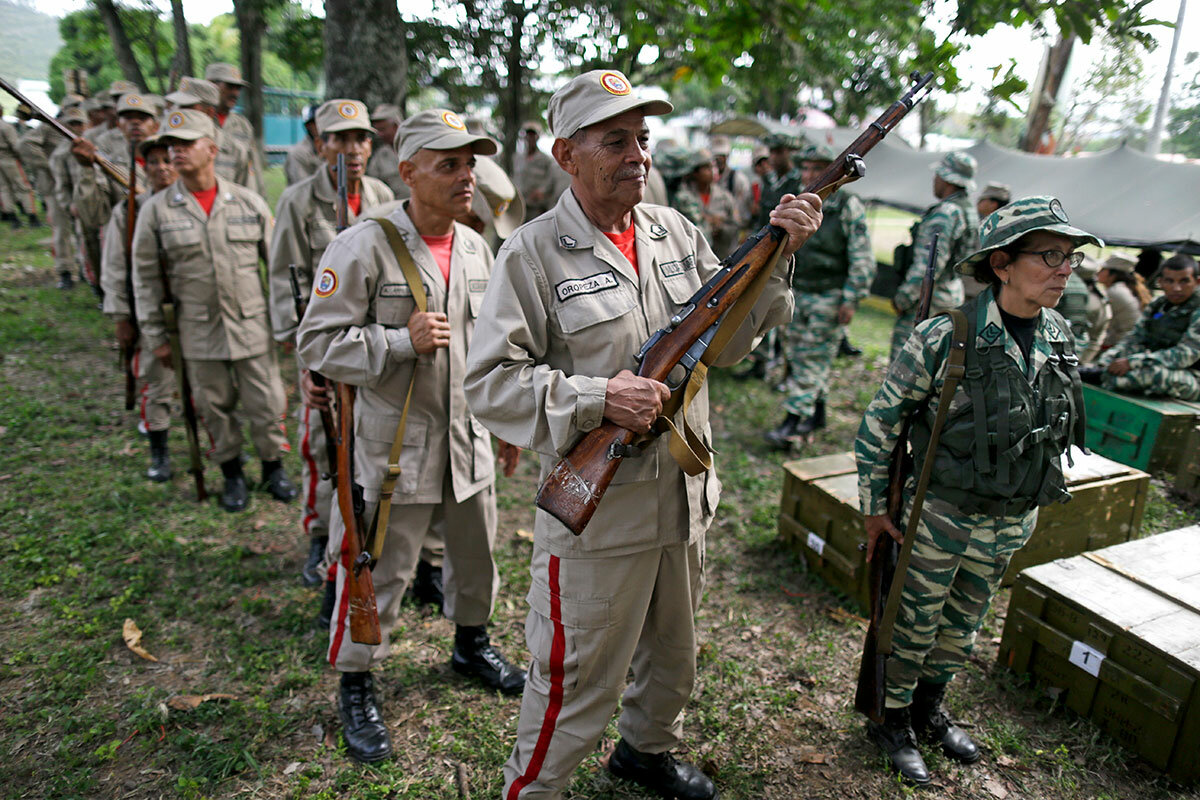
But few regional analysts equate the financial sanctions with a blatant stab at full-on regime change.
Rather, what some experts see in Trump’s actions are aggressive steps that, while perhaps aimed at reversing the course of Mr. Maduro’s government, will instead stiffen the resolve of both the government and the most obdurate factions of the anti-Maduro opposition.
That further polarization of Venezuela’s political camps, coupled with the economic hardships the financial sanctions are likely to exacerbate, will only make it harder for the government to maintain control and reverse the country’s slide.
And it’s that downward spiral that could feed pressures for regime change, some experts say.
“Regime change isn’t necessarily the intent of these latest sanctions, but when you put them together with other actions by the US government it becomes pretty clear they’re doing things to encourage the political transition they’d like to see,” says Alexander Main, an expert in US security relations in South and Central America at the Center for Economic and Policy Research in Washington.
“The strategy,” he adds, “is to create so much economic pain that eventually the vast majority of Venezuelans are clamoring for political change to have some relief.”
Regime change as US policy carries heavy baggage, particularly since President George W. Bush launched the Iraq War to depose Saddam Hussein – resulting in a humanitarian disaster that is still playing out in Iraq (and widely debated) two presidents later.
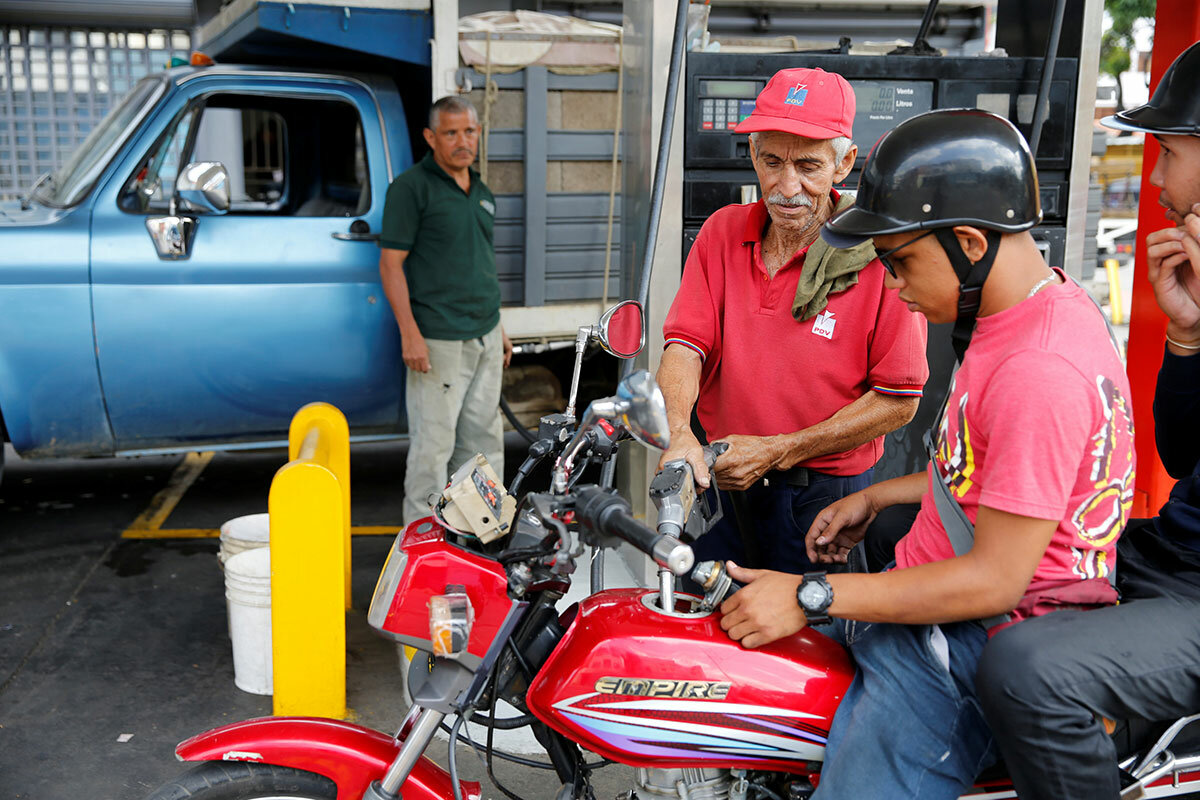
Russian President Putin has emerged as the global defender against American regime-change designs. In Syria he came to the rescue of President Bashar al-Assad when the Syrian leader was under siege from the demands of President Barack Obama that he “must go.”
Now Maduro’s charge that US animosity and aggressive financial actions are destabilizing his government is drawing the attention of Mr. Putin, who appears to be expanding what might be called his “regime defense” ideology to the Western Hemisphere.
Putin has spoken out against what he sees as destabilizing US actions against Venezuela and is taking steps to prop up Maduro. He was one of the few world leaders to endorse Maduro’s recent dissolution of the National Assembly and efforts to write a new constitution concentrating powers in the executive.
And Russia (along with China, another global power opposed to what it sees as Western meddling in sovereign governments’ affairs) is increasingly putting its money where its mouth is: In April the Russian energy giant Rosneft loaned Venezuelan state-owned oil corporation PDVSA $1 billion, bringing recent Russian loans and credits to almost $5 billion.
The Maduro government needs to round up about $5 billion in loans in the coming weeks to avoid defaulting on its debt. And with the new US sanctions effectively cutting off Venezuela’s access to US debt markets, Russia is signaling it could deepen its support for Maduro – perhaps by expanding Rosneft’s stake in PDVSA and some of its profitable domestic and international projects.
Despite what Putin may see in US actions, however, a more accurate name than “regime change” for US objectives might be “behavior change,” some Latin America experts say.
“President Trump’s latest sanctions are qualitatively different in many ways. They are more institutional in nature than the earlier sanctions on individuals, including President Maduro, and they aim to penalize certain behaviors by the Venezuelan state,” says Eric Farnsworth, vice president of the Council of the Americas and the Americas Society in Washington and a former White House adviser on Western Hemisphere policies.
“But I don’t see it being about regime change,” he adds. “It’s about raising the cost of behavior by the government in Caracas that the international community has clearly rejected.” Moreover, the objective is to “incentivize” the government “not to pursue certain actions, like violating demonstrators’ human rights, but to undertake others,” like dialogue with the political opposition, Mr. Farnsworth says.
The problem analysts like Dr. Main see is that, far from encouraging dialogue and political negotiations, the US actions are likely to send the Maduro government and the opposition deeper into their respective corners.
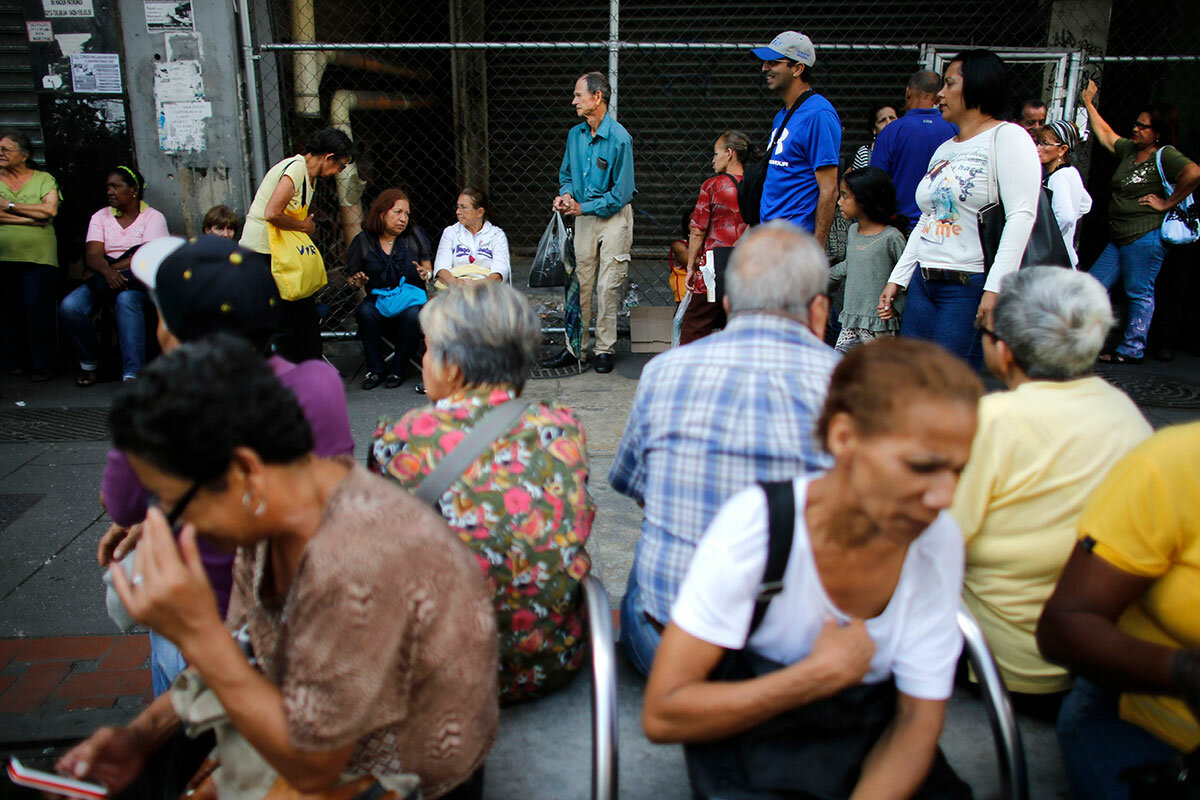
Indeed the intense debate that took place in the White House over the likely ramifications of shifting from individual to broad institutional economic sanctions on Venezuela indicates that not everyone favored such a significant step, at least at this time.
Trump’s decision is widely seen to represent a victory for hardliners – including Sen. Marco Rubio (R) of Florida, and some of the Maduro government’s most virulent expatriate opponents living in exile in Florida – over others, particularly in the State Department, who favored a quieter, diplomatic path.
Under Secretary of State for Political Affairs Thomas Shannon argued for holding off on broad economic sanctions to allow the back-channel talks he had going with Venezuelan officials to continue, according to State Department and other informed sources.
Farnsworth says critics of the Trump administration’s actions should remember that the US has stood by for years with mostly rhetorical punishment as Maduro has taken steps restricting Venezuela’s democracy, monopolizing power, and deepening the country’s humanitarian crisis.
Still, he doesn’t foresee anything underway right now – including what he sees as growing consensus among other Latin American governments over the need for government-opposition dialogue and compromise – that will change Venezuela’s downward spiral any time soon.
“At this point I don’t see that what the US or anyone else does is going to have the impact of causing the government to change its course,” he says. “On the contrary, they [in the government] are going to continue doing whatever they can to keep themselves in power.”

Cambodia’s media crackdown may signal a deeper shift
A hallmark of authoritarian behavior is the shuttering of a free press. One year ahead of elections, outlets in Phnom Penh are disappearing.

- Quick Read
- Deep Read ( 7 Min. )
-
By Nathan A. Thompson Contributor
Sunday, Sept. 3 – the last working day for staff at The Cambodia Daily – started early. Really early. Before 1 a.m., a reporter picked up reports that Kem Sokha, leader of the opposition party, had been hauled off by security officials. Three staff members hotfooted it to Mr. Kem Sokha’s house to break the story. “In some ways, we were relieved to have a big story to report so the focus wasn’t on us,” says the now-defunct paper’s politics editor. The Daily – whose last edition Monday sold out within hours – is just one of more than a dozen news outlets closed in Cambodia in recent weeks after the government claimed they were not in legal compliance. But taken with Kem Sokha’s arrest, analysts say, it’s a troubling crackdown that has made many question the country’s commitment to developing democracy – particularly with elections looming in 2018. In a speech this week, longtime Prime Minister Hun Sen hinted at more arrests. After seeing “the treasonous acts,” he says, “I decided to continue my work 10 years more.”
Cambodia’s media crackdown may signal a deeper shift

The Cambodia Daily office walls are bare but for a few photos of journalists picking splinters on fishing boats and chasing illegal loggers in the forest. The paper moved to new premises in a nondescript street in the capital of Phnom Penh in December 2016, and the space doesn’t feel lived in yet.
It’s as if they expected to get closed down – which they did last week. Vendors in Cambodia’s capital, Phnom Penh, were soon hawking badly photocopied versions of Monday’s last edition after it sold out within hours. The headline took a parting shot at the government that had forced it to close: “Descent into Outright Dictatorship,” it said.
“I went to work for ten years expecting the Daily to get shut down,” says Kevin Doyle, a former editor-in-chief. “People are afraid to speak out in Cambodia’s political environment and we knew our role was to show you should not be afraid.”
The Daily was shut during weeks of turmoil in Cambodia as the government closed radio stations, shut the American-affiliated National Democratic Institute, and imprisoned Kem Sokha, leader of the opposition, for treason. The crackdown was condemned by Cambodia’s donors – except China, which pumps more foreign investment and donations into the country than anyone else – and led some observers, like the US Embassy in Cambodia, to question the country’s commitment to developing democracy – particularly ahead of 2018 elections.
The Daily’s closure, Sokha’s arrest, and the shutting of independent radio stations represent a surge in authoritarian behavior from the government of Hun Sen, Cambodia’s prime minister of 32 years. Analysts say the government is rattled after Cambodia’s opposition party earned 44 percent of votes in June’s local elections, compared to just 31 percent in 2012. Mr. Hun Sen’s Cambodian People’s Party (CPP) took 51 percent.
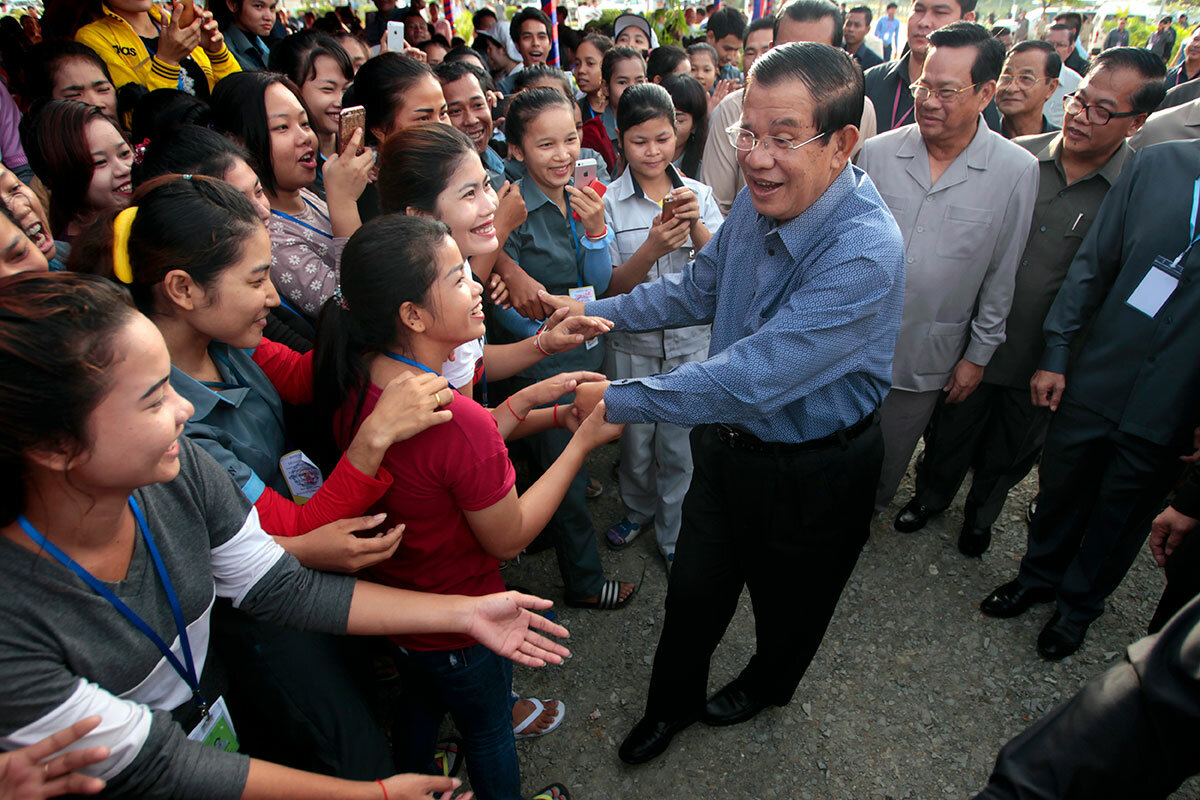
“The crackdown is a tactic by the ruling party to guarantee success in the 2018 general elections,” says rights and economy analyst Ou Virak, founder of the local Future Forum think-tank. “The government is worried.”
“War will happen if the CPP loses control,” Hun Sen said in a speech in May. Taking aim at the opposition, the prime minister said, “No guns are needed to cause war ... words can cause war if the CPP loses patience and [goes] to your homes and burns down your homes.”
A rush of closures
Rumors of the Cambodia Daily’s demise were circulating since Aug. 4, when news that it owed the tax department $6.3 million was leaked to Fresh News, a pro-government outlet.
The tax department calculated the amount without reference to the Daily’s books, although publishers made them available, according to Jodie DeJonge, the Daily’s editor-in-chief. The government has sued the paper’s owners for alleged tax evasion.
The Daily was just one of many organizations the government claimed was not in legal compliance. In late August, 20 independent radio broadcasters who aired programs from the opposition Cambodia National Rescue Party (CNRP) or American-funded Radio Free Asia and Voice of America have been closed. The American-affiliated National Democratic Institute was also shut and its staff booted out of the country.
“There might be some back taxes that we should pay,” said Deborah Krisher-Steele, the Daily’s current owner. “We are perfectly willing to pay … but we weren’t given the chance; it seemed like [the government] were very eager to close us.”
Kong Vibol, head of the tax department, could not be reached for comment.
It was a bleak final editorial meeting. Fingers were pressed to foreheads while Ms. DeJonge coached her staff about speaking to other agencies. “You can speak to the press, just stay away from politics,” she said.
A few days later, on Sept. 2, Ms. DeJong stood up at journalist town hall meeting at Meta House, a German cultural center in Phnom Penh. “Tomorrow, we will go to work on the final issue of the Daily,” she said, her voice breaking. “We will close from Monday.”
Afterwards, journalists shook their heads and swapped memories as if at a wake. Even for those who had never worked there, the Cambodia Daily was a huge piece of Cambodia’s landscape: “a paper whose 24 years of daily editions will long serve as a first draft to modern Cambodian history,” as the Overseas Press Club of Cambodia said in a statement. [Editor’s note: The writer is the president of the press club.]
Founded in 1993, the Daily was Cambodia’s first English-language daily. The Phnom Penh Post, which ran fortnightly, started publishing six days a week in 2008. The Khmer Times joined them in 2014.
“Until the recent closure of The Cambodia Daily, foreign-language newspapers enjoyed a significant degree of freedom,” says Sebastian Strangio, a journalist and author of “Hun Sen’s Cambodia.” “The situation was very different in the Khmer-language media, which for years has been under the tight control of the government.”
Prime Minister Hun Sen has often criticized the Daily and Radio Free Asia. At a May news conference, he scolded their Cambodian staff for working for “American” outlets.
“You work for Radio Free Asia, which is a radio against the government. And you write for Cambodia Daily, which opposes me all the time,” he said, as the Phnom Penh Post reported.
One last story
Sunday, Sept. 3 – the last working day for the Daily staff – started early. Really early.
Before 1 a.m., Phan Soumy picked up reports that Kem Sokha, leader of the CNRP, had been hauled off by security officials. Mr. Soumy and two other Daily reporters hotfooted it to Mr. Sokha’s house to be the first major independent news source to break the story.
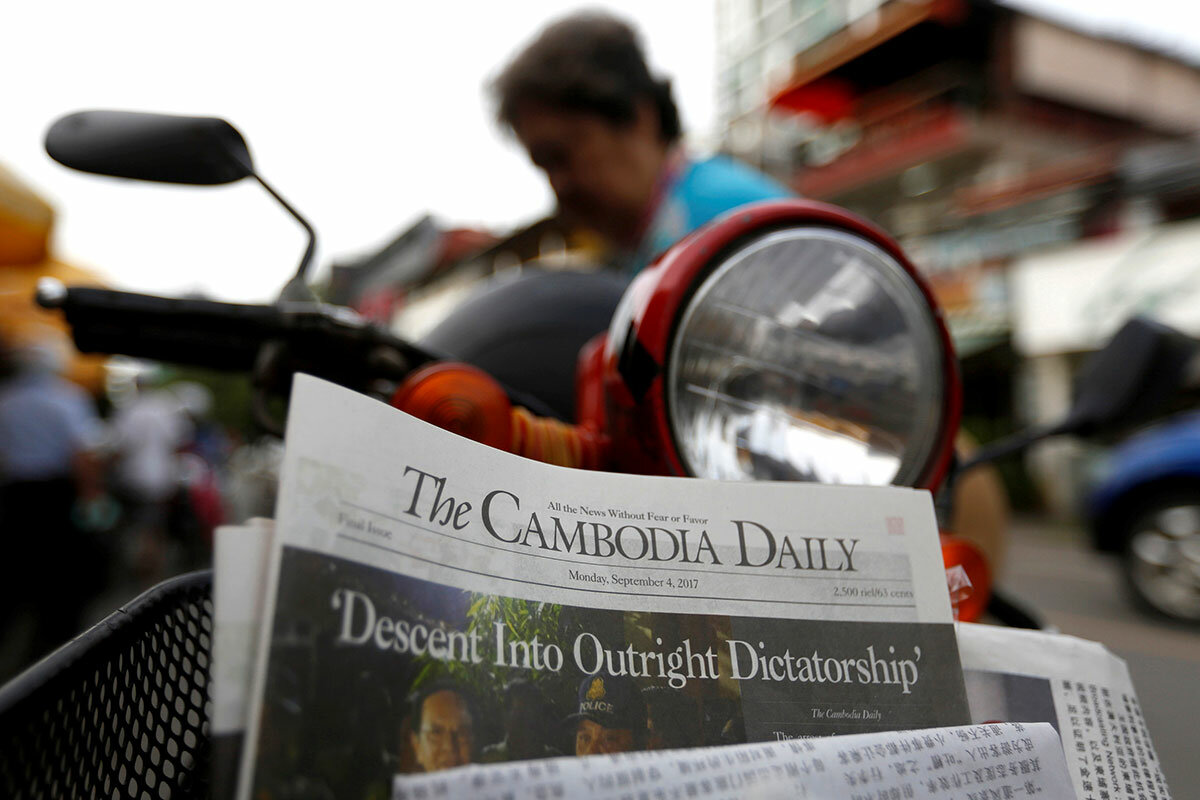
The politics editor, Ben Paviour, was not sleeping that night either.
“I checked our private messages at 4 a.m. and people were already out reporting [Sokha’s arrest], checking details and they were at the police station trying to uncover more facts,” he says. “The last day we worked flat out covering the developments; it was a collaborative effort representing the Daily at its best: scrappy and thorough.”
“It was all a blur and it was surreal,” Mr. Paviour says. “It didn’t feel like the end, but didn’t feel like a normal work day either. In some ways, we were relieved to have a big story to report so the focus wasn’t on us.”
Sokha was charged with treason on Sept. 5, with the government citing a 2013 video as evidence. In the clip, which was released by the government and published on YouTube – bookended with a few bars from John Lennon’s “Imagine” – Sokha talks about effecting grassroots change in Cambodia with American aid.
“Professors at universities in Washington, DC, Montreal, Canada [were] hired by the Americans to advise me on the strategy to change the dictator leader in Cambodia,” Sokha said in the video. The government says it shows he was conspiring to create a revolution with help from the United States.
One-party path?
International analysts, however, view the arrest as one more piece of a broad crackdown. “These are the latest tactics in a sweeping attack on voices that are critical of Cambodia’s prime minister Hun Sen and his allies,” the human rights watchdog Global Witness said in a Sept. 5 statement.
In a Sept. 6 speech to a large gathering of garment workers, Hun Sen alluded to Kem Sokha and warned of more arrests. “Earlier, I hesitated, when should I leave office? But after seeing the tragic event of the treasonous acts of a Khmer, who was arrested – and there might be some more [arrests] – I decided to continue my work 10 years more,” he said, according to the Phnom Penh Post.
If Mr. Sokha is convicted, he will be forced to resign his position or have his party dissolved, thanks to a law passed early this year. While 10 small parties also contested the local elections, none of them won more than 2 percent of the vote: meaning that, if the CNRP are dissolved, Cambodia would effectively become a one-party state.
“To brook dissent means to allow the existence of opposition; to allow the existence of a Fourth Estate which can hold the State accountable,” says Sophal Ear, an associate professor of diplomacy and world affairs at Occidental College in Los Angeles. “Clearly, these things have been assaulted [and] mangled beyond recognition.”
Cambodia’s leaders are dependent on economic growth, Mr. Ou says, meaning that economic pressure could be a lever for change. “The leaders care about the economy and if that starts to be affected the crackdown will have to stop,” he says.
But it’s too late for some two dozen Daily staffers, particularly Cambodians. Aun Pheap, who won an award in June for exposing corruption in the logging industry, poses for a photograph at his desk.
The flash reflects off the white walls. “I have four children and I need to pay for their education,” he says. “I am concerned about my old age because everyone wants young people now.”
Other headline stories we’re watching
(Get live updates throughout the day.)The Monitor's View
How one hurricane left a lesson in gratitude
- Quick Read
- Deep Read ( 2 Min. )
-
By The Monitor's Editorial Board
For Americans hunkered down for hurricane Irma, Vermont’s ongoing commemorations of its comeback from hurricane Irene, which hit six years ago, provide an example of practical gratitude for the redemptive value of social kindness during a disaster. In Vermont’s White River Valley, for example, a recent “resilience festival” offered a 5K run, tree planting, and new ways for people to volunteer in the community. The town of Bethel now holds an annual “pop-up university” in which local people can teach courses and help create a more connected community. Almost every disaster teaches ways to ensure better preparation for the next event. But government cannot be the only responder. To get through a disaster, communities must have a social web of empathy. And one way to nurture that web is to celebrate, out of gratitude, the empathy already expressed during a previous crisis.
How one hurricane left a lesson in gratitude

When hurricane Irene raced up the East Coast six years ago, the storm delivered its biggest punch to the tiny state of Vermont. Floods destroyed more than 1,000 homes, 500 miles of roads, and 200 bridges. It was the state’s worst disaster since 1927. Much of the repair work is now complete. Yet the Green Mountain State still keeps alive one special experience. Many residents have used the Aug. 28 anniversary to celebrate – and expand – both the community spirit that brought them together and the resilience for recovery and rejuvenation.
For Americans hunkered down for hurricane Irma, Vermont’s post-Irene commemorations and celebrations provide an opportunity in practical gratitude for the redemptive value of social kindness during a disaster.
In Vermont’s White River Valley, for example, a recent “resilience festival” offered food, fun, a 5K run, tree planting, and new ways for people to volunteer in the community. People that play together will bounce back better from adversity, organizers said. The town of Bethel now holds an annual “pop-up university” in which local people can teach courses. The aim is to create a more vibrant and connected community. And the state government still sells license plates that read “Vermont Strong.”
Other places have learned to reinforce qualities of character needed during a tragedy. In the rebuilding of lower Manhattan after 9/11, New York highlighted the heroic efforts of first responders. For the 10th anniversary of hurricane Katrina in 2015, New Orleans sponsored a “resilience festival” that included brass bands, dancing, singing, and plenty of official thank-yous for the thousands of volunteers who helped the city recover.
Almost every disaster offers a learning curve, usually for government in ensuring better preparation in physical infrastructure and emergency response. After the devastation of hurricane Andrew in 1992, for example, Florida vastly improved its ability to respond to storm damage and in warning residents when to evacuate. Yet often overlooked is the need to build a community’s togetherness, or the social capital that comes in handy during a major crisis.
Government cannot be the only responder. For Vermont’s 2016 commemoration of its post-Irene experience, then-Gov. Peter Shumlin said it took “endless people” with goodwill to rebuild the state and leave it in better shape. To get through a disaster, communities must have a pre-positioned social web of empathy. And one way to nurture that web is to celebrate, out of gratitude, the empathy already expressed during a previous crisis.

A Christian Science Perspective
Each weekday, the Monitor includes one clearly labeled religious article offering spiritual insight on contemporary issues, including the news. The publication – in its various forms – is produced for anyone who cares about the progress of the human endeavor around the world and seeks news reported with compassion, intelligence, and an essentially constructive lens. For many, that caring has religious roots. For many, it does not. The Monitor has always embraced both audiences. The Monitor is owned by a church – The First Church of Christ, Scientist, in Boston – whose founder was concerned with both the state of the world and the quality of available news.
Guided safely home
- Quick Read
- Deep Read ( 3 Min. )
-
By Christine Jenks Driessen
The recent pictures in the news showing people left homeless by the floods in Texas, Louisiana, and India – or the winds of hurricane Irma in the Caribbean – can be discouraging. But we can find encouragement in the idea that even when circumstances seem dire, we are never left without the tender love of our Father-Mother God. Contributor Christine Driessen experienced this at a time when she was homeless and a wonderful housing solution came to light. What turned her situation around was when she responded to a friend’s request to pray for a lost cat during a major storm and flooding. Her conviction that God’s love never fails any of us inspired her to recognize how God cares for all of us. Every one of us has an inherent receptivity to God’s “angels,” which open our hearts to a sense of God’s infinite love and guide us to solutions that meet our practical need.
Guided safely home
The recent pictures in the news showing people left homeless by ongoing flooding in Texas, Louisiana, India, Nepal, and elsewhere can be very discouraging.
As so many others have been doing, I began praying for everyone affected by the floods. And then I remembered how God, divine Love, met my need at a time of utter desperation, when my daughter and I were suddenly left homeless. I had turned to God so many times in my life and found beautiful answers, but this time I felt so alone.
As I sat crying on the bed, the phone rang. It was a friend who was also in tears. There had been a huge destructive storm with flooding in her area, and her kitty had disappeared in the storm a few days earlier. Even though I love animals, my first thought was: “Your kitty! I can’t even provide a home for my daughter and me!”
But then I remembered that God’s love never fails any of us, even in the worst situations, and I needed to become still so I could hear the Christ, divine Love’s tender message of comfort. I picked up a book of the writings of Mary Baker Eddy, who discovered Christian Science. It fell open to this passage, which refers to God as divine Soul: “Thus founded upon the rock of Christ, when storm and tempest beat against this sure foundation, you, safely sheltered in the strong tower of hope, faith, and Love, are God’s nestlings; and He will hide you in His feathers till the storm has passed. Into His haven of Soul there enters no element of earth to cast out angels, to silence the right intuition which guides you safely home” (“Miscellaneous Writings 1883-1896,” p. 152).
That’s when I realized that we are all safely sheltered in the Christ love that is more powerful than any evil. This Christly truth comes to us as “angel” messages guiding us to an understanding that as children of God, our real home is secure in Love’s care, so it can never be lost. And no one is excluded from God’s infinite love!
With a deep conviction of the truth of these ideas, I assured my friend that her cat was absolutely secure in God’s care. We hung up, and I continued praying. Within minutes, I felt impelled to get in the car and begin driving. I was soon led to a perfect apartment for my daughter and me – affordable and ready for us to move into that day! Not long after that, my friend called me back to say that her cat had been found safely nestled in the school gym across town. The kitty was soon back home.
This experience and many others have shown me that no one can ever be separated from the tender love of our Father-Mother God, nor from the consciousness of divine Love’s ongoing protection and care – our true home!
A version of this article aired on the Aug. 30, 2017, Christian Science Daily Lift podcast.

A message of love
A painted night sky

A look ahead
Thanks so much for reading (or listening, or both!) today. For Monday's package we’re working on a story about how the North Korea crisis affects China’s global and regional ambitions, tests its influence, and illustrates its challenges.



